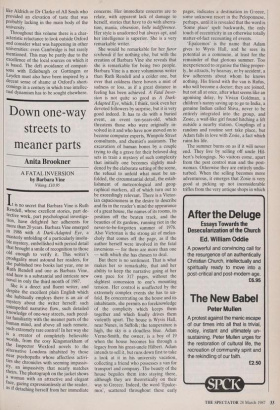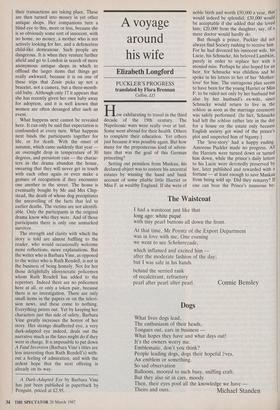Down one-way streets to meaner parts
Anita Brookner
A FATAL INVERSION by Barbara Vine
Viking, £10.95
It is no secret that Barbara Vine is Ruth Rendell, whose excellent stories, part de- tective work, part psychological investiga- tion, have delighted her adherents for more than 20 years. Barbara Vine emerged in 1986 with A Dark-Adapted Eye, a masterly unfolding of a particularly insolu- ble mystery, embellished with period detail that brought a smile of recognition to those Old enough to verify it. This writer's Prodigality must astound her readers, for she published two books last year, one as Ruth Rendell and one as Barbara Vine, and here is a substantial and intricate new novel in only the third month of 1987. She is a direct and fluent writer, and despite the excellent plain English which She habitually employs there is an air of mystery about the writer herself: such unimpeded narrative flow, such detailed knowledge of one-way streets, such pecul- iar familiarity with the meaner parts of the human mind, and above all such remote, such extremely rare control! In her way she is a creator of completely believable worlds, from the cosy Kingsmarkham of the Inspector Wexford novels to the alternative Londons inhabited by those near psychopaths whose affectless activi- ties she chronicles with seeming impassiv- ity,. an impassivity that nearly matches theirs. The photograph on the jacket shows a woman with an attractive and elegant face, gazing expressionlessly at the reader, as if detaching herself from her immediate concerns. Her immediate concerns are to relate, with apparent lack of damage to herself, stories that have to do with aberra- tion, mania, obsession, belle indifference. Her style is unadorned but always apt, and her intelligence is superior. She is a very remarkable writer.
She would be remarkable for her furor scribendi if for nothing else, but with the creation of Barbara Vine she reveals that she is remarkable for being two people. Barbara Vine is a more voluminous writer than Ruth Rendell and a colder one, but over that coldness there hovers a mist of sadness or loss, as if a great distance in feeling has been achieved. A Fatal Inver- sion is not quite so good as A Dark- Adapted Eye, which, I think, took even her devoted followers by surprise, but it is very good indeed. It has to do with a buried event, an event ten-years-old, which threatens those who were originally in- volved in it and who have now moved on to become computer experts, Wimpole Street consultants, and chemist's assistants. The excavation of human bones by a couple trying to dig a grave for their beloved dog sets in train a mystery of such complexity that initially one becomes slightly mad- dened by the elaborate setting of the scene, the refusal to unfold what must be un- folded, the circumstantial detail, the estab- lishment of meteorological and geog- raphical markers, all of which turn out to be exceedingly relevant. There is a Victor- ian capaciousness in the desire to describe and fix in the reader's mind the appearance of a great house, the names of its rooms, its position off the beaten track, and the beauties of its gardens, running riot in the never-to-be-forgotten summer of 1976. Also Victorian is the strong air of melan- choly that comes off the page, as if the author herself were involved in the fatal inversions — for there are more than one — with which she has chosen to deal.
But there is no sentiment. That is what makes her so remarkable, that and her ability to keep the narrative going at her own pace for 317 pages, without the slightest concession to one's mounting tension. Her control is unaffected by the extremely complex events she has to un- fold. By concentrating on the house and its inhabitants, she permits no foreknowledge of the complicity which keeps them together and which finally drives them violently apart. The house is Wyvis Hall, near Nunes, in Suffolk; the temperature is high, the sky is a cloudless blue. Adam Verne-Smith, the owner, is a boy of 19 when the house becomes his through a legacy from his great-uncle Hilbert. Adam intends to sell it, but runs down first to take a look at it in his university vacation, collecting a friend who possesses a van for transport and company. The beauty of the house beguiles them into staying there, although they are theoretically on their way to Greece. Indeed, the word `Epalce- mos', scattered throughout these early pages, indicates a destination in Greece, some unknown resort in the Peloponnese, perhaps, until it is revealed that the word is 'Some place' spelt backwards, the only touch of eccentricity in an otherwise totally matter-of-fact recounting of events.
`Epalcemos' is the name that Adam gives to Wyvis Hall, and he sees its potential as a commune, at least for the remainder of that glorious summer. Too inexperienced to organise the thing proper- ly, he attracts, by hearsay, or by accident, a few adherents about whom he knows nothing. His friend with the van is Rufus, who will become a doctor; they are joined, but not all at once, after what seems like an agonising delay, by Vivian Goldman, a children's nanny saving up to go to India, a genuine Indian called Shiva, never to be entirely integrated into the group, and Zosie, a waif-like girl found hitching a lift outside a nearby station. Couplings of a random and routine sort take place, but Adam falls in love with Zosie, a fact which ruins his life.
The summer burns on as if it will never end. They live by selling off uncle Hil- bert's belongings. No visitors come, apart from the pest control man and the post- woman. Otherwise they are entirely undis- turbed. When the selling becomes more adventurous, it emerges that Zosie is very good at picking up not inconsiderable trifles from the very antique shops in which their transactions are taking place. These are then turned into money in yet other antique shops. Her companions turn a blind eye to this, more or less, because she is so obviously some sort of innocent, with no home, no money, a mother who is not actively looking for her, and a defenceless child-like demeanour. Such people are dangerous. It is when they venture further afield and go to London in search of more anonymous antique shops in which to offload the larger items that things get really awkward, because it is on one of these trips that Zosie picks up not a bracelet, not a camera, but a three-month- old baby. Although only 17 it appears that she has recently given her own baby away for adoption, and it is well known that women are often deranged after such an event.
What happens next cannot be revealed here. It can only be said that expectation is confounded at every turn. What happens next binds the participants together for life, or for death. With the onset of autumn, which came suddenly that year — an overnight drop in temperature of 30 degrees, and persistent rain — the charac- ters in the drama abandon the house, swearing that they will never get in touch with each other again or even make a gesture of recognition if they encounter one another in the street. The house is eventually bought by Mr and Mrs Chip- stead, the death of whose dog precipitates the unravelling of the facts that led to earlier deaths. The victims are not identifi- able. Only the participants in the original drama know who they were. And of those participants there is only one unmarked survivor.
The strength and clarity with which. the story is told are almost baffling to the reader, who would occasionally welcome more reflections, more explanations. But the writer who is Barbara Vine, as opposed to the writer who is Ruth Rendell, is not in the business of being homely. Not for her those delightfully idiosyncratic policemen whom Ruth Rendell has added to the repertory. Indeed there are no policemen here at all, or only a token pair, because there is no investigation. There are only small items in the papers or on the televi- sion news, and these come to nothing. Everything peters out. Yet by keeping her characters just this side of safety, Barbara Vine greatly increases the horror of her story. Her strange disaffected eye, a very dark-adapted eye indeed, deals out the flarrative much as the fates might do if they were in charge. It is impossible to put down A Fatal Inversion (Barbara Vine's titles are less interesting than Ruth Rendell's) with- out a feeling of admiration, and with the ardent hope that the next offering is already on its way.
A Dark-Adapted Eye by Barbara Vine has just been published in paperback by Penguin, priced at £2.95.



















































 Previous page
Previous page